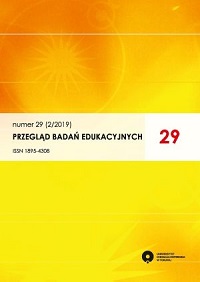University Students Practising towards Teacher’s Profession in Poland, Latvia and Belarus – Motives and Educational Aspirations Found among Generation ‘Z’
DOI:
https://doi.org/10.12775/PBE.2019.013Keywords
generation Z, motives, educational aspirations, university students, faculty of education, Poland, Latvia, BelarusAbstract
Education together with its accompanying plans and hopes becomes a significant element of designing process shaped by an individual and referred to his future career. Motives which determine the decision of taking up higher education training, university course and gaining knowledge significantly determine life realizations, young people’s future jobs and their careerchoice. The following monograph focuses on motives and educational aspirations of students representing generation ‘Z’, who have taken up their studies at the departments of education in Poland, Latvia and Belarus. During the research it was aimed to look for an answer
to the following questions: what criteria influenced the students’ choice about the university course? What were their motives to gain higher education? How the respondents estimated their knowledge and skills? How much time do university students spend on studying and how they fill up their free time? How do they perceive current education? What factors allow achievement of their educational aspirations and what attitudes about the future are presented by the students? What, according to the respondents, limits educational development and gaining knowledge? Finally, what are the obstacles in implementing personal plans related to education? The research was conducted among the group of 246 university students. The study
followed a diagnostic survey method supported by the author based auditorial questionnaire survey. The thorough analysis was made with the use of SPSS programme. In spite of revealed differences, generally, the research results regarding educational aspirations
of generation ‘Z’ present the examined group as optimists who appreciate their self-development. Mainly it is their personal interests which influences their choice of university studies at educational departments. The studies do not mean social prestige for the examined
and therefore, they rather reject the stereotype of being a good student. They are flexible and combine university course with work which is supposed to be their passion. This circle of students mainly praise quick action and practical solutions, still looking ahead towards future even if they are aware of the fact that the studies do not guarantee an employment in
teacher’s profession.
References
Chomątowska, B., Żarczyńska-Dobiesz, A. (2016). DNA lidera według przedstawicieli pokolenia „Z”. Prace Naukowe Uniwersytetu Ekonomicznego we Wrocławiu, 430, pp. 58–65.
Creswell, J. W. (2013). Projektowanie badań naukowych. Metody jakościowe, ilościowe i mieszane. Kraków: Wydawnictwo Uniwersytetu Jagiellońskiego.
Dobek-Ostrowska, B. Sobera, W. (2017). Rola metod badawczych w studiach komunikologicznych.
In: B. Dobek-Ostrowska, W. Sobera (eds.), Badania ilościowe i jakościowe w studiach nad komunikowaniem (pp. 19–31). Wrocław: Wydawnictwo Uniwersytetu Wrocławskiego.
Gerlach, R. (2014). Edukacja w warunkach zmian cywilizacyjnych. Przegląd Pedagogiczny, 2, pp. 11–19.
Hipsz, N. (2013). Wykształcenie ma znaczenie. Komunikat z badań. Warszawa: CBOS, BS/96/2013.
Łobocki, M, (1999). Wprowadzenie do metodologii badań pedagogicznych. Kraków: Oficyna Wydawnicza „Impuls”.
Maszke, A. W. (2003). Metodologiczne podstawy badań pedagogicznych. Rzeszów: Wydawnictwo Uniwersytetu Rzeszowskiego.
Nowak, S. (1970). Metodologia badań socjologicznych. Warszawa: Wydawnictwo Naukowe PWN.
Mouffe, Ch. (2005). On the Political. London and New York: Publishers Taylor & Francis Group.
Roguska, A., Antas-Jaszczuk, A. (2017). Aspiracje życiowe studentów kierunku pedagogika w Polsce, na Łotwie i Białorusi. Edukacja ustawiczna dorosłych. 1(96), pp. 59–67.
Strauss, W., Howe, N., (1991). Generations: The History of America’s Future, 1584 to 2069. New York: Publishers William Morrow and Company.
Szkoły wyższe i ich finanse w 2016 roku Warszawa: Główny Urząd Statystyczny, Departament Badań Społecznych i Warunków Życia.
Wciórka, B. (2009). Aspiracje i motywacje edukacyjne Polaków w latach 1993–2009, Komunikat z badań, , Warszawa: CBOS. BS/70/2009.
Wróblewska, W. (2000). Implikacje aspiracji edukacyjnych młodzieży dla uprawiania dydaktyki. Toruńskie Studia Dydaktyczne, ROK IX (16), pp. 86–94.
Wrzesień, W. (2015). Pokoleniowość współczesnej polskiej młodzieży. Władza Sądzenia, 7, pp. 37–55.
Żarczyńska-Dobiesz, A., Chomątowska, B., (2016). Zarządzanie pracownikami z pokolenia paradoksów. Nauki o zarządzaniu. Management Sciences. 2(16), pp. 196–206.
Downloads
Published
How to Cite
Issue
Section
Stats
Number of views and downloads: 627
Number of citations: 0



